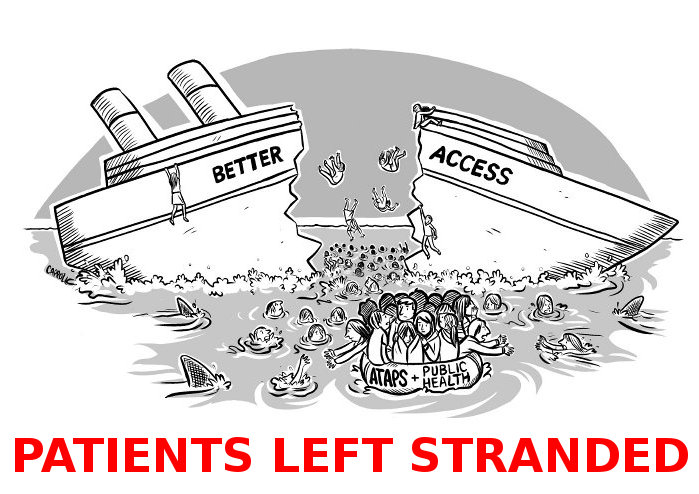
Thousands of Australians with a diagnosed mental health disorder have been left stranded by the Government by cuts to psychological services in the Better Access program. The Government has argued that cutting services will save money, however, people who have used the scheme have joined with mental health practitioners in condemning the changes, which has seen the length of treatment halved in one fell swoop. They point out that the rationale for cost-savings from the Federal Mental Health Minister, Mark Butler, claiming that most people only use 6 sessions, simply do not make sense. That is, when people do not access mental health services that they are eligible for, it comes at no cost to the taxpayer. Campaigners argue that if the Government is serious about putting mental health on a level playing field with physical health, then these cuts amount to saying that because most people only access a GP three times a year, then that is the maximum they should be entitled to receive under Medicare. Such an argument would not be acceptable in physical health care, and likewise, it should not be accepted in mental health care.
Up until recently, not many people understood what it would mean when the cuts to psychological services went ahead. Those who appreciated why cutting services off at ten sessions is a bad idea didn’t need to have it explained to them. Conversely, those who are relatively unfamiliar with the reality of living with a mental health problem have found it more difficult to identify with these complex issues. Since November clicked over and the Government rammed through these cuts, we have started to see increasing numbers of people feeling the impact of these changes. People reaching out for help have realised that there were no more options for them and that the message between the lines from the Federal Government was basically that everyone has to battle with their condition until next year. I find it a great pity that we often need to feel some pain ourselves to realise that there is a problem, but unfortunately, that seems to be the status quo for raising awareness about the need for adequate mental health care in this country.
Reports are emerging from the public service and from mental health agencies that they are being inundated by those who have been cut off from Medicare-funded treatment. Months ago, we advised the Government that this would happen, which is why we called for a 12 month moratorium on the decision. The Minister did not take our advice before implementing these changes and did not wait until the parliamentary inquiry on mental health funding and administration to release their report. Consequently, we now have a dire situation where there are no other options for people who have been cut off from treatment. New programs are not ready and many of the Medicare Locals have not even been formed yet. That is why we are seeing people scrambling to get appointments with psychiatrists and cramming public mental health programs far beyond their capacity.
Those in favour of cutting the Better Access program recently suggested that people who are campaigning against these cuts to the Better Access program are “focused on the needs of the patient in front of them”, implying that they are not “considering the broader population’s needs”. This is a bewildering claim to make given the fact that we have repeatedly called for proportionate expansion of mental health services across the board. We can only guess that the criticism arises from the fact that campaigners have done their best to raise public awareness about the perspective of mental health consumers who have been hit the hardest by the cuts. The current crisis where mental health consumers are struggling to find appropriate treatment highlights the problems for the wider mental health system that we have been warning the Government about. That is, the Better Access program must be seen as part of a wider system of care and support for people struggling with psychological distress. Hence, cutting psychological services in the Better Access program below minimum treatment guidelines will naturally have overflow effects that will obstruct access to other valuable programs.
The reason we have focused on mental health consumers is that the media has been saturated with the opinions of lobby groups and well-recognised mental health figureheads vying to get a bigger slice of the pie in federal spending directed to their programs of choice, including their own private bodies. Many people in the general public have been disappointed to see the usual suspects taking every opportunity to slam the Better Access program when this program has been so overwhelmingly successful. It is quite plain to see that there is an agenda coming from those making the most noise – an ideological bias squarely focused on removing Medicare-refunded psychological services for people who need them. Needless to say, we make no apologies for sharing the stories of people who need psychological treatment, rather than the more organised network of figures who are collectively lobbying against the fee-for-service model. When one considers the fact that those criticising the Better Access program were against the program before it was even launched, it becomes clear that we need a sensible approach that takes into consideration the perspectives of other parties, and most importantly, looks to the evidence of the merits of this program.
The Alliance for Better Access are much more interested in looking after the needs of distressed people who require psychological care – and we think the Government should be too. We urge the Government to listen to both The Greens and the opposition, who are both calling on these cuts to be overturned.


